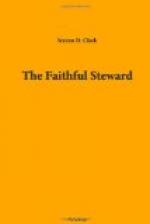In the first place, it would not be equal. An alleged requisition, not pressing equally upon all in its ordinary operations, cannot rise out of the necessary relations of the spiritual universe, and therefore is not essential to a moral government. It can be made obligatory on the conscience only by a positive precept from the Great Lawgiver himself. But no ratio of income, universally applicable can be assigned, pressing equally upon all. While one’s income may be large, his debts may likewise be large. Another’s health may be feeble, his family numerous, and his expenses great; while his neighbor’s constitution may be vigorous, his family small, and his necessary expenditures few. Thus circumstances may render it a greater sacrifice for some to give a twentieth, a fiftieth, or even an hundredth of their income, than for others to bestow one half, or indeed, the whole of it, and thousands besides.
One’s entire possessions must be taken into the calculation. Take a simple case. Two men start in business together; both plan and toil for ten years. One has an expensive family, parents to maintain, children to support and educate; he has been withal unfortunate, and has laid up scarcely a thousand dollars. The other has no family, has prospered and accumulated ten thousand. The eleventh year Providence smiles upon both alike; the income of each is a thousand dollars. Now, would it be equal to require of both respectively a hundred in charity?
Nor can any ratio of standing property and income combined be designated, ensuring equality. Though this might approximate towards equalizing the burden, still the same or similar causes would prevent a uniform pressure. Besides, calls on our benevolence are not always equally loud or imperious; and therefore, with the same means, more is demanded on some occasions than others.
Undoubtedly there is a certain amount of property, which, taking into view the whole circle of one’s relations, he ought to contribute in charity. It is by no means contended that one cannot fix upon a definite amount for himself. This he may and should do. All that we aver is, that no general rule can be made, assigning that amount, because no general rule can meet the ten thousand circumstances that modify individual cases; and, therefore, obligations to comply with it would not be universally felt. Besides, no one thinks of specifying certain proportions of labor and attention which all are equally bound to bestow on others; and yet, these are sometimes far more beneficial to the suffering than gifts of money. To assign a certain number of external acts employed in charitably distributing property, while we fix upon no definite amount of labor to be expended in beneficence, is making a difference without a reason; this being seen, the conscience will not be holden, unless some scripture precept can be found demanding the discrimination.




